
Sega AM Research & Development No. 2, previously known as SEGA-AM2 Co., Ltd., is a video game development team within the Japanese multinational video game developer Sega. Yu Suzuki, who had previously developed arcade games for Sega including Hang-On and Out Run, was the first manager of the department.

Urban Champion (アーバンチャンピオン) is a fighting video game developed and published by Nintendo in 1984. It was first released for the Famicom and Nintendo VS. System for arcades in 1984, and later released for the Nintendo Entertainment System in North America and Europe in 1986. It was inspired by the 1984 Game & Watch game Boxing. It is Nintendo's first 2D fighting game, eventually followed in 1993 by Joy Mech Fight, released exclusively in Japan for the Famicom.

In entertainment, a virtual band is a band or music group whose depicted members are not people, but animated characters or virtual avatars. The music is recorded by real musicians and producers, while any media related to the virtual band, including albums, video clips and the visual component of stage performances, feature the animated line-up; in many cases the virtual band members have been credited as the writers and performers of the songs. Live performances can become rather complex, requiring perfect synchronization between the visual and audio components of the show.
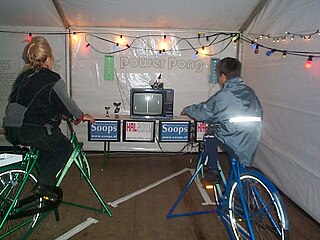
Fitness game, exergame, and gamercise are terms used for video games that are also a form of exercise. Fitness games rely on technology that tracks body movement or reaction. The genre has been used to challenge the stereotype of gaming as a sedentary activity, and promoting an active lifestyle among gamers. Fitness games are seen as evolving from technology aimed at making exercise more fun.

Wii Sports is a 2006 sports simulation video game developed and published by Nintendo for the Wii video game console. The game was released in North America along with the Wii on November 19, 2006, and in Japan, Australia, and Europe the following month. It was included as a pack-in game with the console in all territories except Japan, making it the first sports game included with the launch of a Nintendo system since Mario's Tennis for the Virtual Boy in 1995. The game was later released on its own as part of the Nintendo Selects collection of games.

Wii Fit is a 2007 exergaming video game designed by Nintendo's Hiroshi Matsunaga for the Wii home video game console, featuring a variety of yoga, strength training, aerobics, and balance mini-games for use with the Wii Balance Board peripheral. Matsunaga described the game as a "way to help get families exercising together". It has since been adopted by various health clubs around the world, and has previously been used for physiotherapy rehabilitation in children and in nursing homes to improve posture in the elderly.

Gold's Gym: Cardio Workout is an exercise video game for Nintendo's Wii video game console, developed by Japanese video game developer Rocket Company and released in the late 2000s worldwide.

Hatsune Miku, officially code-named CV01, is a Vocaloid software voicebank developed by Crypton Future Media and its official anthropomorphic mascot character, a 16-year-old girl with long, turquoise twintails. Miku's personification has been marketed as a virtual idol, and has performed at live virtual concerts onstage as an animated projection.
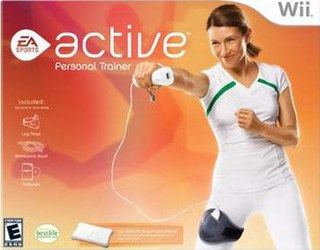
EA Sports Active: Personal Trainer is a video game developed by EA Canada for the Wii console. It was released on May 19, 2009 in North America. The game ships with a strappable pouch to hold the Nunchuk and a resistance band.

Hatsune Miku: Project DIVA is a series of rhythm games created by Sega and Crypton Future Media. The series currently consists of 6 main titles, released on various PlayStation consoles, the Nintendo Switch, Microsoft Windows, and in arcades, the 2 Project Mirai games for the Nintendo 3DS, and 4 spin-offs for mobile and VR platforms. The series primarily makes use of Vocaloids, a series of singing synthesizer software developed by the Yamaha Corporation, and the songs created using these Vocaloids, most notably the virtual-diva Vocaloid Hatsune Miku.
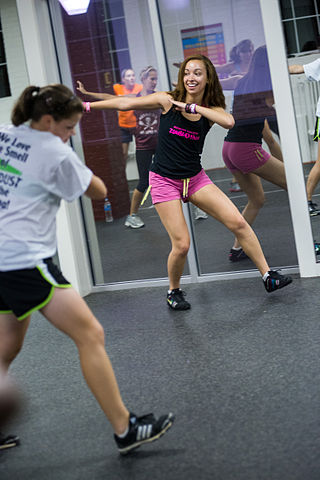
Zumba is a fitness program that involves cardio and Latin-inspired dance. It was founded by Colombian dancer and choreographer Beto Pérez in 2001. It currently has 200,000 locations, with 15 million people taking classes weekly, and is located in 180 countries. Zumba is a trademark owned by Zumba Fitness, LLC.
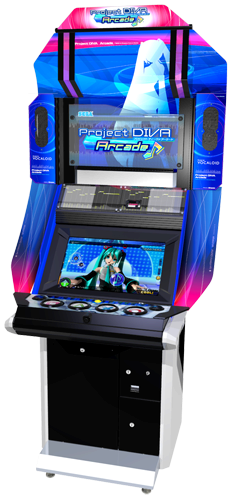
Hatsune Miku: Project DIVA Arcade is a 2010 arcade rhythm game developed by Sega AM2 and published by Sega and Dwango Music Entertainment as well as character and voicebank licensing from Crypton Future Media for arcade machines with the Sega RingEdge arcade system. The game is a port of the 2009 video game, Hatsune Miku: Project DIVA, with updated visuals and was released on June 23, 2010 in Japan. Like the original, the game primarily makes use of Vocaloid, a singing synthesizer program, and the songs are created using voicebanks from the program, most notably, the most-famous and moe anthropomorphic virtual diva and mascot Hatsune Miku.
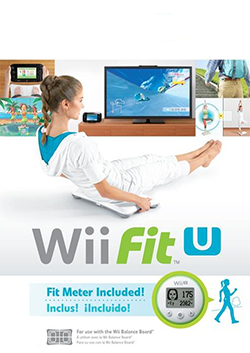
Wii Fit U is an exergaming video game developed by Nintendo for the Wii U console, and is the successor to the Wii games Wii Fit and Wii Fit Plus. Wii Fit U utilizes both the Wii Balance Board and the Wii U GamePad in gameplay, and is bundled with the newly introduced Fit Meter, an activity meter accessory. It was released in Japan on October 31, 2013, followed by North America and Europe one day later. It is also the only game on the system to support the balance board.

Crypt of the NecroDancer is a roguelike rhythm game by Brace Yourself Games. The game takes fundamental elements of a roguelike dungeon exploration game and adds a beat-matching rhythm game set to an original soundtrack written by Danny Baranowsky. The player's actions are most effective when moving the character set to the beat of the current song and are impaired when they miss a beat, so it is necessary to learn the rhythmic patterns that the various creatures follow. The mixed-genre game includes the ability to import custom music, and the option to use a dance pad instead of traditional controllers or the keyboard. The game was released for Linux, OS X, and Windows in April 2015, being co-published by Klei Entertainment, for the PlayStation 4 and Vita in February 2016, for the Xbox One in February 2017, and for Nintendo Switch in February 2018. Crypt of the NecroDancer Pocket Edition, developed for iOS, was released in June 2016.
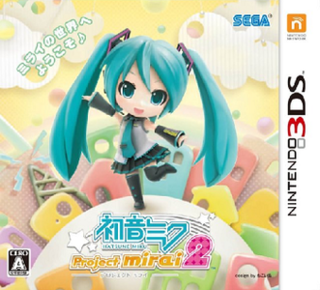
Hatsune Miku: Project Mirai 2 is a rhythm game created by Sega and Crypton Future Media for the Nintendo 3DS and the sequel to Hatsune Miku and Future Stars: Project Mirai. The game is also a spin-off of the Hatsune Miku: Project DIVA series of Vocaloid rhythm games and was first released on November 28, 2013 in Japan with no international release until September 2015. Like the original, the game primarily makes use of Vocaloids, a series of singing synthesizer software and the songs created using these vocaloids most notably the virtual-diva Vocaloid Hatsune Miku. It is also the second game to include a Vocaloid made by Internet Co., Ltd., Gumi. An updated version of the game was released in 2015, first in Japan as Hatsune Miku: Project Mirai Deluxe, then in North America and Europe under the title of Hatsune Miku: Project Mirai DX.

The Peacock Theater, formerly Nokia Theatre and Microsoft Theater, is a music and theater venue in downtown Los Angeles, California at L.A. Live. The theater auditorium seats 7,100 and holds one of the largest indoor stages in the United States.
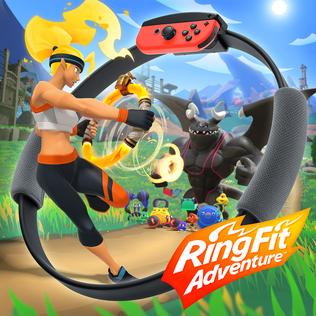
Ring Fit Adventure is an exercising action role-playing game developed and published by Nintendo for the Nintendo Switch. The game comes with two physical components: the Ring-Con, a Pilates ring that the user holds and one Joy-Con slots into, and a Leg Strap, a piece of fabric affixed to the user's leg that holds the other Joy-Con.

Kimi to Fit Boxing is a Japanese anime television series adaptation of the Nintendo Switch game named Fitness Boxing. The series was produced by Japanese studios Imagineer and Story Effect, and it aired from October to December 2021.


















